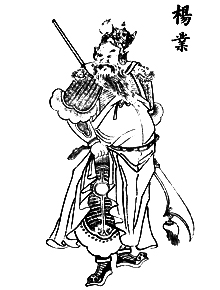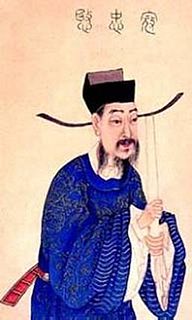
Yang Ye (楊業) or Yang Jiye (楊繼業), named Liu Jiye (劉繼業) before 979 and Yang Chonggui (楊重貴) in his youth, was a military general in imperial China, serving first the Northern Han state during the last years of the Five Dynasties and Ten Kingdoms period, and later the Song Dynasty which annexed Northern Han in 979.
Li Tao (1115–1184), courtesy name Renfu or Zizhen, art name Xunyan, was a Song dynasty historian and scholar-official who devoted four decades of his life compiling Xu Zizhi Tongjian Changbian, a monumental reference book chronicling the history of the Northern Song (960–1127).
Guo Zhongshu, courtesy name Shuxian, was a Chinese painter, scholar, calligrapher and philologist during the Five Dynasties period and Song dynasty. He was noted for his paintings of landscapes and structures.

Pan Mei (潘美) was a military general and statesman in the early years of imperial China's Song Dynasty. In the 970s, he was the main commander in Song's conquest of Southern Han and also played pivotal roles in the conquest of Southern Tang and Northern Han. Afterwards he fought the Khitan-ruled Liao Dynasty on Song's northern border.

Gao Huaide (高懷德) courtesy name Cangyong was a general in ancient China, first in the Later Zhou military and later in the Northern Song military.
Wang Qinruo, courtesy name Dingguo, was an official in China's Northern Song Dynasty. He was the chancellor from 1017 to 1019 during Emperor Zhenzong's reign and from 1023 to 1025 during Emperor Renzong's reign.

Kou Zhun, courtesy name Pingzhong, was a much-praised official in ancient China's Northern Song Dynasty. He was the chancellor from 1004 to 1006 during Emperor Zhenzong's reign.
The Xu Zizhi Tongjian Changbian is an 1183 Chinese history book by Li Tao which chronicles the history of Northern Song Dynasty (960–1127). The book took Li Tao about 40 years to complete and was finally published in 1183 with 980 chapters. However, only 520 chapters are extant. As the sequel to Sima Guang's landmark work Zizhi Tongjian, it follows the same format, but is not as concise and refined.

Empress Dowager Du was an empress dowager of imperial China's Song Dynasty. She was the wife of general Zhao Hongyin and the mother of Emperor Taizu of Song, who founded the Song Dynasty.
Wang Pu (王溥) (922–982) was a chancellor of imperial China's Later Zhou and Song Dynasty.

The Song conquest of Northern Han occurred in 979, when Northern Song forces captured the Northern Han capital of Taiyuan in present-day Shanxi Province after a two-month siege. A relief attempt by forces of the Liao dynasty, which was allied to the Northern Han, was easily defeated by the Northern Song. Yelü Dilie, a cousin of the Emperor Jingzong of Liao, was killed along Yelü Sha's son Yelü Deli (耶律德裏).
Ding Wei, courtesy name Gongyan, was a Song dynasty chancellor, who dominated the courts during Emperor Zhenzong's later reign and Emperor Renzong's early reign.
Wang Ze was a rebel leader during Emperor Renzong's reign in the Song dynasty, whose agrarian army occupied Bei Prefecture for 65 days before it was crushed by the government army led by Wen Yanbo.
Zhou Huaizheng was a powerful Song dynasty palace eunuch during Emperor Zhenzong's reign. After Emperor Zhenzong's illness in 1019 made him incapable of ruling, state power gradually fell to the hands of his wife Empress Liu and chancellor Ding Wei. Zhou plotted to assassinate Ding so that Kou Zhun could return to chancellorship, but his coup failed. He was arrested by Lei Yungong and executed.
Lei Yungong was a Song dynasty palace eunuch who rose to power after foiling fellow eunuch Zhou Huaizheng's coup. He dominated court politics following Emperor Zhenzong's death, by associating with the powerful grand councilor Ding Wei. However, just a few months later he was beaten to death for illegally moving Emperor Zhenzong's burial site to acquire treasures.

Wen Yanbo, courtesy name Kuanfu, was a scholar-official of the Song dynasty who served four emperors over more than five decades. He was a grand councilor during Emperor Renzong's reign.

Shen Lun, known as Shen Yilun before 976, was a scholar-official who successively served the Later Han, Later Zhou and Song dynasties. He was one of the Song dynasty grand councilors between 973 and 982.

Wang Dan, courtesy name Ziming, was a major politician in the Song dynasty, serving as the grand councilor from 1006 until shortly before his death in 1017. Well trusted by Emperor Zhenzong, Wang Dan was given plenipotentiary authority over some matters after 1008.
Lu Zhen (c.957–1014), courtesy name Zifa, was a Song dynasty scholar-official, historian, poet and diplomat. He was famous for his writings, including Jiu Guo Zhi, a history book on the Five Dynasties period.
Haji Sumatrabhumi was a king of the Srivijaya Kingdom who sent envoys to the Chinese Song dynasty in 1017. His name is recorded in Li Tao's Xu Zizhi Tongjian Changbian as Xiachi Suwuzhapumi. The title "Haji" was generally a denomination for a vassal king.








